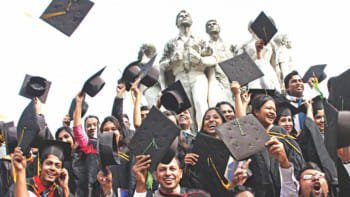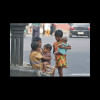Bangladesh needs a new vision for social protection

Social protection is an important fiscal policy instrument that not only helps smoothen consumption and reduce poverty and inequality, but also spurs growth via raising the aggregate demand. Since independence, Bangladesh's social protection, a key policy instrument in the country, has had a history of innovation evolved around crises (e.g. market failures, floods and droughts, and needs of special geographical areas). The country now spends about three percent of the GDP on social protection programmes covering around 35 percent of its citizens.
Before 2015, the goal was to extend relief to the poor. The year 2015 was thought to be a gamechanger for the social protection system in Bangladesh, with the preparation and approval of the National Social Security Strategy (NSSS) – with an overarching goal to move from a poor relief system to a system addressing life cycle risks. The NSSS laid down bold programmatic and institutional reforms, focusing on programme consolidation, increased beneficiary coverage along with spending, digitalised social and beneficiary registries, and a results-based monitoring system. A roadmap was also prepared to implement the reforms. However, progress with the NSSS reforms has been slow.
Seven years after the NSSS was approved, our social protection system is still composed of 100-plus programmes, most of which are small, with exclusion errors of about 70 percent, implying the inability of the system to reach the deserving beneficiaries – referring to 50-60 percent of the citizens who are vulnerable but not covered, and large gaps between the supply side (budget allocations) and the demand side (needs by life-cycle-based groups). It reveals a huge coverage gap of 49 percent and resource gap of 29 percent, remaining static as it fails to align with demographic changes and urbanisation of poverty. It also suggests that young children who account for almost one in every eight poor persons receive only 1.6 percent of social protection expenditures, and 18 percent of the urban poor receive 11 percent of social protection expenditures. The overall outcome is low value for money (i.e. estimated cost effectiveness of only 0.6) for investment of around three percent of GDP.
Approaches to social protection during Covid-19 also have implications for Bangladesh's social protection system. During Covid, the global system not only witnessed unprecedented horizontal and vertical expansions, but also recorded the emergence of new instruments to tackle new vulnerabilities that could not be addressed with traditional programmes. New risks emerging out of the Covid crisis relate mostly to women, children, marginalised groups, and informal workers. In particular, temporary basic income (TBI) for women has emerged as an innovative social protection programme, which especially targets vulnerable women (mostly from the informal sector) and calls for universal early learning and care for children.

TBI for women is a policy instrument – an unconditional cash transfer to identify women beneficiaries for a specific time period that recognises the disproportionate effect of a crisis on a group that faces persistent and cumulative vulnerabilities across several dimensions. This is especially important because of the strong positive correlation between the availability of childcare services and women's labour force participation. Research has found that the boost in female labour supply from universal childcare was experienced most strongly among lower-income households – since high-income households are able to purchase their own childcare services privately, in the absence of a more accessible public system. Global studies also report another important feature – that childcare doesn't cost, it pays – implying that there is no additional fiscal pressure on governments.
Bangladesh is at a crossroads with choices to make between moving full steam ahead with time-bound implementation of reforms or maintaining the status quo of half-hearted attempts to reforms. Against these backdrops, future agendas for the social protection system in Bangladesh must be explored. Given that the country aims to attain upper middle-income status in 2030, the future vision of its social protection system should be inclusive, leaving no one out. Bangladesh must take steps to immediately implement the unfinished reforms laid out in the NSSS. However, given the new risks that have emerged out of the Covid crisis (e.g. disproportionate impacts on women, children, marginalised groups, and informal workers), the full implementation of the NSSS may not ensure 100 percent inclusivity.

How should the system be strengthened? It should focus on: (i) A dynamic, digitised data system powered by social and beneficiary registries; (ii) Improved selection of deserving beneficiaries based on geographical, demographic, and community-based targeting; (iii) Expanding coverage of G2P payments focusing on financial literacy training, financial inclusion and digital equity; (iv) Gender mainstreaming encompassing gender-sensitive, responsive and transformative approaches; and (v) Management information system and results-based monitoring and evaluation system using social and beneficiary registries.
The hallmarks of the approach are that (i) It asks for a balanced approach with four pillars; (ii) It paves the way for programmes or instrument diversification through social assistance, social insurance and labour market regulations; (iii) It addresses informality and initiates the process of formalisation; (iv) It provides scope to develop care services; (v) It opens up room for private sector participation; and (vi) It ensures fiscal sustainability by allowing public-private partnership in programme development, financing and delivery.
Given the slow progress and the need for new instruments to address new vulnerabilities emerging out of the pandemic, Bangladesh needs to revisit the NSSS to set a new vision or approach to social protection. The new approach should be such that no one is left out. Accordingly, a new framework has been advocated based on four pillars of social protection: social assistance, social insurance, labour market policies, and social care.
The key to any reform is political will. We hope that there will be strong political support for future social protection in Bangladesh – one which will have an all-inclusive system at the heart of it.
Dr Bazlul H Khondker is an economist and a former professor of economics at Dhaka University.

 For all latest news, follow The Daily Star's Google News channel.
For all latest news, follow The Daily Star's Google News channel. 









Comments